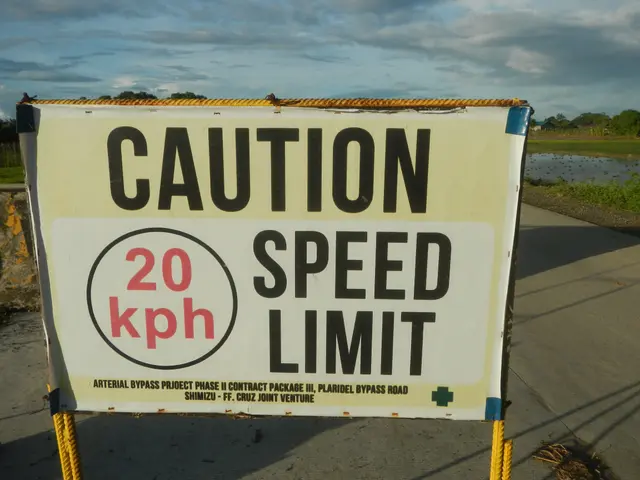"Local democracy faces a blow with the passing of the Duplomb Act"
In a significant show of unity, French local elected officials and over a million citizens have raised concerns about the Duplomb Law, primarily due to its potential environmental and health risks. The law, which seeks to reintroduce the neonicotinoid pesticide acetamiprid, banned since 2018, is seen as a scientific, ethical, and environmental aberration.
The primary concerns revolve around threats to biodiversity and public health, particularly the impact of neonicotinoids on bees and other pollinators essential for ecosystems and food security. These pesticides cause neurological harm to insects, leading to massive bee deaths that jeopardize agricultural pollination and environmental balance.
Moreover, the Duplomb Law is criticised for encouraging industrial-scale farming practices such as megabasins and large farms, potentially accelerating unsustainable agriculture that harms soil health and water resources.
There is also an imbalance between agricultural competitiveness and environmental regulations, with fears that reinstating acetamiprid undermines France's constitutional right to a healthy environment. This concern is further heightened by the fact that the law was rushed through parliament without adequate debate, creating political divisions and public frustration over policy transparency and ecological priorities.
Local officials are actively engaged in their territories, supporting short circuits, organic agriculture, protecting pollinators, and committing to public management of water and its improvement. They see the Duplomb Law as a step backward in these efforts, risking worsening biodiversity loss, harming human and environmental health, and favoring large agribusiness interests over sustainable farming and public good.
The common good necessitates a rethinking of the forced marriage between agriculture and the agro-food industry, where the latter weighs five times more than the former. This sentiment is echoed in the over 2 million signatures on a petition against the Duplomb law on the National Assembly's website.
The popular wave resonates in communes, where elected officials express concerns daily about the deterioration of environmental health. On June 5th, doctors warned about the generalized contamination of wheat with cadmium, a toxic heavy metal. Inserm also warns about the worrying increase in pediatric cancers and fertility disorders, linked to chronic exposure to certain chemical products.
Efforts are being made to make polluted rivers accessible again, like the Seine in Paris, the Marne, and the Allier, allowing for the return of aquatic fauna. This is a historical record for the number of signatures on a petition, with no notable initial associative or media support.
In 2019, a collective of 120 mayors requested the prohibition of glyphosate on their territories, up to the Council of State. For years, cities and intermunicipalities have been committed to a trajectory without phytosanitary products.
According to a study published in Nature Communications in 2017, the populations of flying insects have decreased by 75% in Western Europe in less than thirty years. This alarming statistic underscores the urgent need for action to protect our environment and ensure the health and wellbeing of future generations.
References: [1] Le Monde (2021) Les maires de France dénoncent le Duplomb, une loi écologique qui risque de nuire à la santé publique. Retrieved from https://www.lemonde.fr/les-decisions-publiques/article/2021/06/15/les-maires-de-france-denoncent-le-duplomb-une-loi-ecologique-qui-risque-de-nuire-a-la-sante-publique_6066490_3234.html
[2] France Info (2021) Les maires de France dénoncent le Duplomb, une loi écologique qui risque de nuire à la santé publique. Retrieved from https://www.francetvinfo.fr/societe/environnement/les-maires-de-france-denoncent-le-duplomb-une-loi-ecologique-qui-risque-de-nuire-a-la-sante-publique_3770447.html
[3] La Croix (2021) Les maires de France dénoncent le Duplomb, une loi écologique qui risque de nuire à la santé publique. Retrieved from https://www.la-croix.com/societe/ecologie/les-maires-de-france-denoncent-le-duplomb-une-loi-ecologique-qui-risque-de-nuire-a-la-sante-publique-2021-06-15-3043473
[4] Libération (2021) Les maires de France dénoncent le Duplomb, une loi écologique qui risque de nuire à la santé publique. Retrieved from https://www.liberation.fr/planete/2021/06/15/les-maires-de-france-denoncent-le-duplomb-une-loi-ecologique-qui-risque-de-nuire-a-la-sante-publique_1819366
[5] Nature Communications (2017) More than 75% decline over 27 years in total flying insect biomass in protected areas. Retrieved from https://www.nature.com/articles/ncomms13187
Read also:
- Germany's three-month tenure under Merz's administration feels significantly extended
- Hurricane-potential storm Erin forms, poised to become the first hurricane in the Atlantic Ocean this year.
- Skepticism About Climate Change Previously Held; Factors That Shifted Perspective Revealed
- Heavy rain causes flash floods in Hyderabad, resulting in severe waterlogging and disruptions to city life during a heavy downpour.







